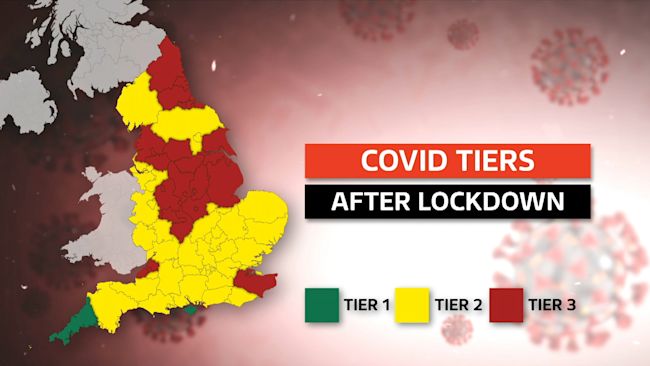
Boris Johnson has written to Tory MPs in bid to quell rebellion over the introduction of coronavirus tiers
Furious Tory MPs had lined up to say they would vote against plans to put 99 per cent of the country in the two tiers with the most severe restrictions.
The system had been expected to last until the end of March.
Boris Johnson has written to Conservative MPs offering them a second vote on the coronavirus tier system early next year as he seeks to head off a backbench rebellion in the Commons this week.
The Prime Minister has angered some of his party with a plan to impose stringent restrictions across much of England when the national lockdown ends on Wednesday, and could struggle to get the measures through Parliament on Tuesday.
But in a letter to colleagues on Saturday evening, Mr Johnson said the regulations would contain a sunset clause – or expiry date – of February 3, with MPs offered the chance to vote to extend them.
The Government will review local areas’ tiers every fortnight and bring the regulations before Parliament after the fourth review on January 27 which will determine whether the tier system stays in place until the end of March.


Mr Johnson also said the first such review, on December 16, would consider the views of local directors of public health, with a final decision on whether any areas should change tiers made at a Cabinet committee. The changes would come into effect on December 19.
What can you do in each tier from December 2? The new rules in England at a glance:
- Tier 1: Up to six people can meet indoors or outdoors. Pubs and restaurants can open, with last orders at 10pm and closing at 11pm.
- Tier 2: No mixing indoors, apart from support bubbles. Up to six people can meet outdoors. Pubs and restaurants can open, with last orders at 10pm and closing at 11pm – but alcohol can only be served with a substantial meal.
- Tier 3: No mixing indoors. People can only meet outdoors in limited places such as parks and public gardens. Pubs and restaurants must close, with the exception of takeaway sales.
In a further olive branch to MPs, the Prime Minister committed to publish more data and outline what circumstances need to change for an area to move down a tier, as well analysis of the health, economic and social impacts of the measures taken to suppress coronavirus.
Only the Isle of Wight, Cornwall, and the Isles of Scilly will be under the lightest Tier 1 controls, while large swathes of the Midlands, North East and North West are in the most restrictive Tier 3.
In total, 99% of England will enter Tier 2 or 3, with tight restrictions on bars and restaurants and a ban on households mixing indoors when the four-week national lockdown lifts on Wednesday.

Several senior Tories have expressed opposition to the plan, including the 1922 Committee chairman Sir Graham Brady who said he wanted to see people “treated as adults” and trusted with their own health decisions.
He told BBC Radio 4’s Any Questions: “I find so many people have been engaged in a wholly responsible way in trying to make sure they can continue some kind of family life, some kind of social life, but being safe, being responsible throughout.
“Especially the older people, who are typically more vulnerable to Covid-19, are also the people who are likely to be most responsible.”
Tory MP Craig Mackinlay, who represents South Thanet which has the second highest R-rate in the UK, said he is planning to vote against the new tiered restrictions on Tuesday.
He told BBC Breakfast that he would instead favour natural “self-regulation” which he says happens when people see the R-rate in their local area starting to rise.
But Chris Hopson, chief executive of NHS Providers, urged MPs to think what the NHS might be like in January, saying: “You need to take the precautions now to ensure that the NHS doesn’t get overwhelmed at what is always its busiest time of year.”
Mr Johnson acknowledged on Friday that people felt “frustrated”, particularly in areas with low infection rates which now face tighter restrictions than before the lockdown.
He said: “The difficulty is that if you did it any other way, first of all you’d divide the country up into loads and loads of very complicated sub-divisions – there has got to be some simplicity and clarity in the way we do this.
“The second problem is that, alas, our experience is that, when a high incidence area is quite close to a low incidence area, unless you beat the problem in the high incidence area, the low incidence area, I’m afraid, starts to catch up.”
Support Independent Journalism Today
Our unwavering dedication is to provide you with unbiased news, diverse perspectives, and insightful opinions. We're on a mission to ensure that those in positions of power are held accountable for their actions, but we can't do it alone. Labour Heartlands is primarily funded by me, Paul Knaggs, and by the generous contributions of readers like you. Your donations keep us going and help us uphold the principles of independent journalism. Join us in our quest for truth, transparency, and accountability – donate today and be a part of our mission!
Like everyone else, we're facing challenges, and we need your help to stay online and continue providing crucial journalism. Every contribution, no matter how small, goes a long way in helping us thrive. By becoming one of our donors, you become a vital part of our mission to uncover the truth and uphold the values of democracy.
While we maintain our independence from political affiliations, we stand united against corruption, injustice, and the erosion of free speech, truth, and democracy. We believe in the power of accurate information in a democracy, and we consider facts non-negotiable.
Your support, no matter the amount, can make a significant impact. Together, we can make a difference and continue our journey toward a more informed and just society.
Thank you for supporting Labour Heartlands











